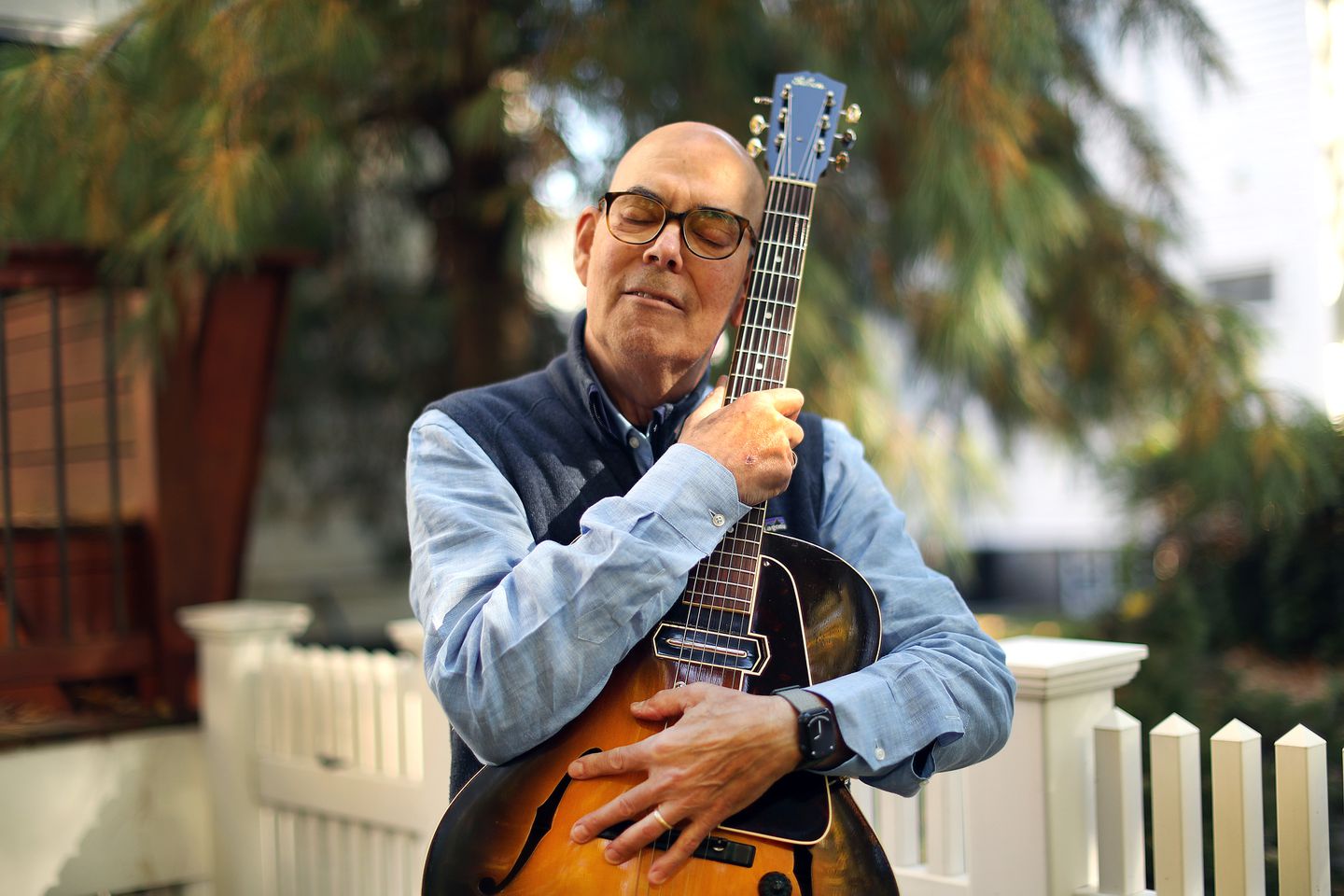
Now that he’s able to play again, jazz guitarist John Stein can exhale
By Jon Garelick Globe correspondent.
Jazz guitarist John Stein is happy to be able to play guitar again after being diagnosed in 2021 with a debilitating autoimmune disorder.
The problem started with his eyes.
In the spring of 2021, John Stein, a jazz guitarist and retired Berklee College of Music professor, was out taking a walk and noticed that the overhead telephone lines were doubled.
He’d had cataract surgery on his left eye about a year before, but the double-vision, among other issues with his eyesight, was new. His eye doctor doubted that a right-eye cataract was the problem, and his retinas were healthy. But removing the cataract could only be beneficial, so why not?
But following the second surgery, the vision problems persisted. Another exam revealed that his eyes weren’t tracking properly, but there was no apparent cause. Then other issues emerged — his left eyelid wouldn’t close, his right eyelid drooped. Other muscle groups were being affected — it was hard to hold his head up in certain positions. After he started to have trouble swallowing, he called his doctor’s office.
The staff nurse had a neurology background. She knew the symptoms. “Do you want me to call an ambulance?” she asked. “Or can someone take you to the hospital? Right now.”
Over the course of several days, Stein found himself in intensive care, his condition rapidly worsening, including difficulty breathing. Eventually, he was intubated and, for a couple of days, unconscious.
Tests confirmed the nurse’s suspicion: a rare autoimmune disease called myasthenia gravis, which affects muscle groups including those that control breathing.
Luckily, myasthenia gravis is well known to physicians.
“The doctors said to me, ‘John, we don’t know what causes this, but we know how to treat it,’” Stein recalls. At this point, he was immobilized, unable to swallow food, or breathe on his own. “They gave me every assurance that I would be able to recover and be darn close to who I was before. . . . So I had that in my back pocket the whole time.”
Still, it was a long road. Six weeks of complicated medical treatments, another two weeks of physical rehabilitation.
Stein arrived home weak and emaciated. He asked his wife, Liz, to bring him his guitars. “I practically started weeping. The guitars were so beautiful.” But playing? “I didn’t have strength to press down the strings.”
So Stein, a well-regarded musician with more than 15 albums to his name as a leader, faced an uncertain future as guitarist.
Fortunately, one of his first visitors in the hospital had been Neal Weiss, head of the New Bedford-based Whaling City Sound label, which had released most of Stein’s albums for the past 20 years. A new album had been planned; that was now scrapped. But Weiss had another idea: a compilation.
Track selection and sequencing kept Stein occupied during his many weeks of recovery and rehab, and Weiss kept pressing him to choose more and more material. “The real generosity for me emotionally, though, was the fact that it gave me something to do,” Stein says.
The resulting two-disc 26-track “Lifeline” is like a portable John Stein. The varied cast of supporting players alone is impressive: local Boston heroes like trumpeter Phil Grenadier;bassists Keala Kaumeheiwa, John Lockwood, and Ed Lucie; flutist Fernando Brandão; the Brazilian drummer Zé Eduardo Nazario; and the late saxophone legend David “Fathead” Newman, to name just a few.
The material ranges from Brazilian bossa nova and Argentine tango to organ-trio funk and plenty of straight-ahead jazz swing, mixing standards with Stein originals. The late, beloved Boston singer and GBH jazz radio host Ron Gill, with his typically warm and relaxed delivery, sings Brazilian songwriter Ivan Lins’s “Love Dance,” a vehicle for George Benson, and the Vernon Young/Jack Elliott standard “A Weaver of Dreams.”
The through-line, however, is Stein’s guitar: his personal sense of swing, his detailed touch, his harmonic imagination. Stein hears funk not as hard dance grooves but as another kind of swing. When, on the original “Funkin’ It Up,” he lays back on the beat with Lockwood, Nazario, and Jake Sherman on organ and piano, the groove floats and breathes.
Which goes back to Stein’s recovery. When he was in the hospital, he and his wife’s friend Jeanne Segal, a singer, educator, and vocal coach, offered to teach him breath-support exercises as part of his recovery. Oddly enough, though he had taught singing as part of his ear-training classes at Berklee and thought of himself as a melodic player, he had never incorporated a singer’s breath-controlled phrasing in his approach to guitar playing. Now he did. And as he regained strength in his hands, he also incorporated some of the elements of touch and phrasing that he had discovered while compensating for weak muscles. “It led to my feeling like, wow, in some ways I could have more chops,” Stein says.
On Nov. 4, Stein will celebrate the release of “Lifeline” with bassist Lucie, pianist Jesse Taitt, drummer Mike Connors, and special guest Cindy Scott on flute and vocals, at Scullers Jazz Club. When I talked to Stein at his home in Jamaica Plain, he sounded eager to play again. After all he’s been through, it should be as easy as breathing.
JOHN STEIN
At Scullers Jazz Club, 400 Soldiers Field Road. Nov. 4 at 7 p.m. $35-$50. scullersjazz.com
Jon Garelick can be reached at garelickjon@gmail.com.

